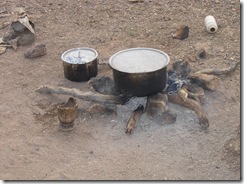
A story has it that once a weary traveller came to a nomadic family by dusk. Unable to continue on with his journey, he decided to stay the night with the family that night. But due to the rainless season, the family had nothing much to offer. Noticing this, the guest did not expect a grand feast from the family and decided to be content with whatever he was given. Preserving his name, the head of the family ordered the children to bed and asked his wife to slaughter one of the lean goats in the pen, which she did immediately and served the guest. In the morning, before the man embarked on his journey, he turned to the head of the family and asked:
‘Do you want me to repay you five-fold for your hospitality or mention your name among the meeting with elders?
And the man replied: ‘I’d prefer it if you mentioned my name in your meetings with the elders.’
Though I cannot confirm the truthfulness of this story, it is indubitable that to be perceived a generous man is a gift too great to be conferred upon a Somali nomad. In order for the guest to have suitable bedding, the young ones must sleep on bare earth; in order for him to have a plenteous meal and milk to quench his hunger and revitalise the deteriorating muscles, the children must sleep hungry that night. At all cost, the guest must be fully accommodated with sufficient food and bedding. Sometimes if the drought intensifies and the head of the house has nothing to offer the guests (if they are in number) he then runs to his nearest neighbours, requesting their help in lending him some food or accommodating the guests on his behalf.
Xirsi Cilmi Goolle was a man much loved for his generosity and genteel manners throughout Berbera and its vicinity. And when his time had come, a great devastation spread all over the area. When the news of his death reached Cali Jaamac Haabiil, a well-known poet who lived during the era of the great Sayyid Mohamed Abdulle Hassan (Known as Mad Mullah to the British) and renowned for his retaliatory poems against the Dervishes, he was exceptionally affected. Therefore, he composed a poem detailing six distinctive things by which he cannot forget Xirsi for. He said:
- Galgaladkaygii xalay iyo Faaraxow gama’ la’aantayda
- Gogoshaan ku jiifsaday hurda goodkii igu yaacay
- Gasiinkii la ii dhigay waxaan gowska uga daayey
- Dad guryii ka yimid baa war baas iila soo galaye
- Gablamooyin waxay ii wadeen guul darriyo hooge
- Geeridii Xirsey sheegayeen gacal ha waayeene
- Gabbal baa u dumay reerihii geliga Booc yiile
- Abidkii rag waa go’i jiree tanise waa gawre
- Lix haloo u wada gaar ahaa gocanayee mooyee
- My tossing and turning last night O’ Faarax and my sleeplessness
- The bedding that I slept on and the bugs that bit me
- The reason why I did not eat the food that was kept for me
- People from the settlement have reached me with distressing news
- Woe to them! They have brought me but sadness and despair
- Xirsi’s demise they mentioned, may they lose their dear ones
- Darkness has befallen the residents of Booc and its vicinity
- Though men had always met their deaths, yet this is devastating
- Except for six distinctive things that I constantly yearn for
In a manner similar to that of Asnaan Sharmaake, after the first few opening lines of his poem, Haabiil goes on to state six things distinctive to the character of Xirsi. Without having to go through the entire poem, here is the stanza that talks about his hospitality:
- Geb haday martidu soo tiraahdo goor uu nala joogo
- Godka lagu janneyoo haduu goosan la carraabo
- Garabsaar rag weeyee haduu gogosha soo daadsho
- Gasiinkii lasoo dhigay hadaad gol iyo daad mooddo
- Bakhayl bays gamiimee haduu gaarka ka qoslaayo
- Godolkuu ku haasaawinirey gocanayaa mooyee
- When the guest suddenly arrive while he is in our presence
- May paradise be his, if he gathers the absconded flock
- He is a benefactor of men, if he spreads out the mats
- The food outspread; if you’d think it but a valley of flood
- And it’s misers often sulk, if he blissfully beams from the corner
- The pleasant banter with which he entertained I constantly yearn
Qawdhan Ducaale and Cabdi Gahay Warsame Baanje were two great poets renowned for their brilliant oratory throughout Somalia. It is said that they were bitter enemies when it came to poetry and used to recite unpleasant verses about one another. After several inflammatory poems, Qawdhan recited a poem insulting Warsame Baanje (Cabdi’s father) of stinginess, lack of hospitality towards his guests. He said:
- Marti daasha leh oo goor maqrib ah dadabta loo heelay
- Inuu meyd digaaga u qalo dudana mooyaane
- Inuu gool dureemada ku koray dacal ugu logo laga waa
- When at dusk the weary guests are shown their quarters
- Except that he serves them dead chicken and then sulks
- That he slaughters them a healthy camel is against his custom


























